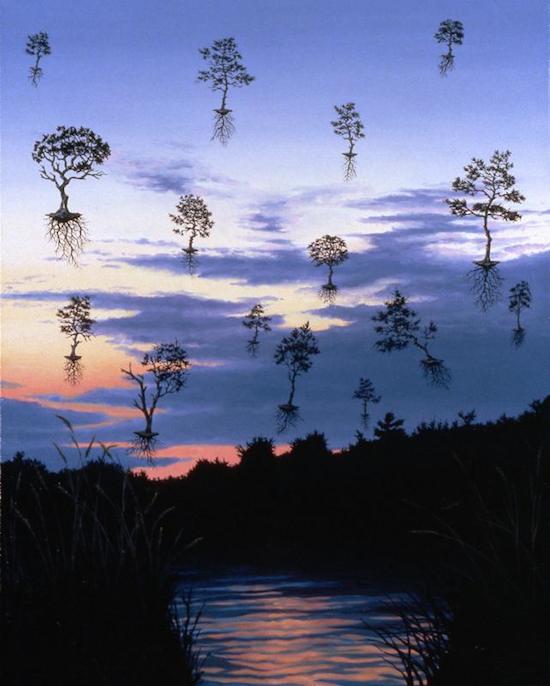'It might as well be spring'
 "Leaving Dennis at Dusk'' (oil on canvas), by C.J. LORI, in the show "Leaving,'' at Galatea Fine Art, Boston, May 1-31.
"Leaving Dennis at Dusk'' (oil on canvas), by C.J. LORI, in the show "Leaving,'' at Galatea Fine Art, Boston, May 1-31.
I can't remember for a long time a landscape so beaten down by a brutal winter as this year's -- flattened shrubs, broken tree branches, etc. Of course, we bring our own sense of being beaten down to it.
Still, as the grass turns green on south-facing slopes, the crocuses fade and the tulips push up, it seems that when full spring arrives this year, it will be particularly lush. I vividly remember the spring of 1961, after a bad winter, though not as bad as they one we just went through. (There were only three huge storms in the winter of 1960-61. One was the famous Kennedy Inauguration Snowstorm.)
It seemed as if the big elm, maples and oak trees would never leaf out, and then, in about two days in the first week of May, there was a green explosion in the western Boston suburb where I found myself living. The next few weeks were so breezy, warm, lush and deliciously melancholic that it was virtually impossible to focus on such June horrors as final exams.
On some days, there were blizzards of dogwood petals. As a line from the Rodgers and Hammerstein song "It Might as Well Be Spring'' had it: "I feel so gay in a melancholy way that it might as well be spring.''
That was written for a 1945 move called State Fair, and the word "gay'' merely meant happy, though Cole Porter, himself gay, used the word in a different way in a 1941 song called "Farming''. He was making fun of the many celebrities buying country places in such places as Fairfield and Litchfield counties, in Connecticut, upper Westchester County, N.Y., and New Hope, Pa.
His line goes:
Don't inquire of Georgie Raft Why his cow has never calfed, Georgie's bull is beautiful, but he's gay!
George Raft was a gangster-movie star of the time.
Ah, the great evolutionary glories of the English language!
--- Robert Whitcomb
Pre-rock memories
"Dance to the Music,'' by JUDY ROBINSON-COX, at Alperts Fine Art, Andover, Mass. The increased interest in pre-rock, Great American Songbook music shown by older Baby Boomers these days, and even by the likes of the pre-Baby Boomer Bob Dylan, shows how as you head into old age, memories from childhood tend to come flowing back.
The music referred to here is a song from "South Pacific,'' the Rodgers & Hammerstein musical that premiered in 1949 and was based on James A. Michener's book Tales of the South Pacific, which stemmed from his Navy service in World War II.

